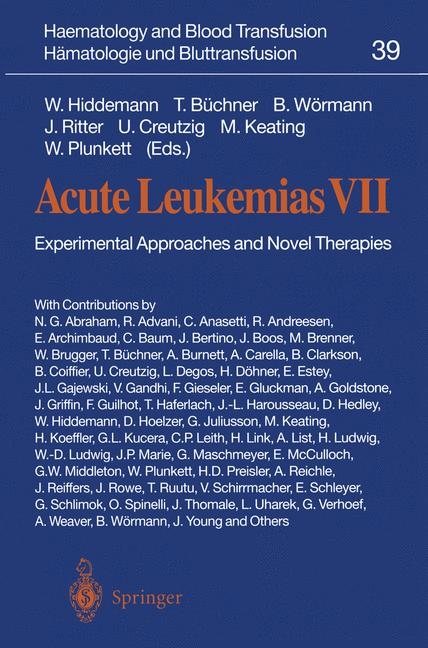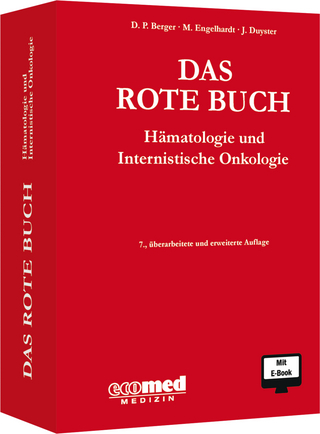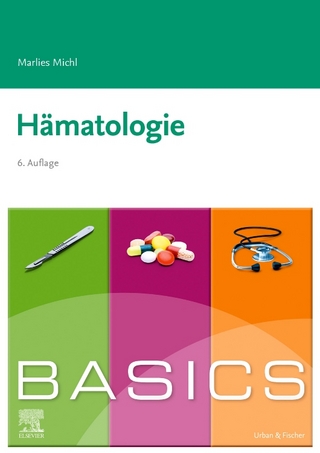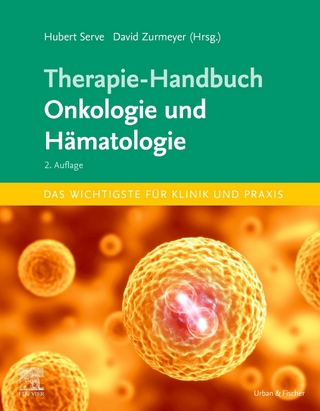
Acute Leukemias VII
Springer Berlin (Verlag)
978-3-642-71962-2 (ISBN)
- Titel wird leider nicht erscheinen
- Artikel merken
The 7th volume of the book series Acute Leukemias provides new updates on the biology of acute leukemias and especially the underlying genetic and molecular events. High quality contributions are provided by leading scientists and clinicians making the book an excellent overview over most recent achievements which translate into new treatment strategies and hence an improved outlook for patients suffering from acute leukemias.
Leukemia Cell Biology.- Alterations of DNA Repair: Implications for Leukemia Cell Biology.- Functional Characterization of Leukemic Stem Cells in Acute Myeloid Leukemia.- Involvement of CD34+ Stem Cells in Malignant Transformation in AML and MDS — Genetic Analysis of Sorted Subpopulations by Classical and Molecular Cytogenetics.- Mutations of Mitochondrial DNA as an Early Event in the Pathogenesis of Myelodysplastic Syndromes.- Pilot Study of Pentoxifylline and Ciprofloxacin with or without Dexamethasone Produces Encouraging Results in Myelodysplastic Syndromes.- Expression of Differentiation Antigens on Blast Cells of Acute Myelogenous Leukemia (AML MO-M6).- Cytoplasmatic Expression of CD34 in Acute Leukemia.- Flow Cytometry of Leukocyte Alkaline Phosphatase in Human Hematopoietic Cells.- Biologic Determinants for AML Therapy.- Evaluation of NOD-SCID-Mice for a Human-B-Cell Precursor ALL Xenograft Model.- Flow Cytometric Analysis of Immature Cell Populations in B-Cell Precursor ALL.- Immunophenotypical Subtype of Childhood T-ALL with Favourable Outcome in the COALL 1985–1992 Study Group.- Acute Leukemias with Hybrid Features in Children and Adolescents from Kiev Region (Ukraine).- CD95 (FAS/APO-1) Antigen Expression on the Cells of Myelodysplastic Syndromes, Acute Myelogenous Leukemia and Chronic Myelogenous Leukemia Patients.- The Premyelodysplastic State and the Secondary Hematologic Disorders.- Physiological Events during Ara-C Toxicity Mapped Using Multiparametric Flow Cytometry.- CD95-Mediated Apoptosis in Acute Myeloid Leukemias (AML): Dependence on Maturational State and Growth Characteristics In Vitro.- Structural Properties of the Cell Membrane of Apoptosis-Induced Cells and Leukemic Blast Cells Studied by Electrospinresonance-Spectroscopy.- Simultaneous Detection of Leukemic Blast Cells on PB/BM — Smears Combining May-Gruenwald Giemsa- and APAAP-Staining.- Anomalistic Signaling as a Possible Biochemical Explanation for Discordant Maturation in Chronic Myelogenous Leukemia (CML).- Transformation of Myeloid Cells by the BCR/ABL Oncogene.- New Isoforms of the ZFM 1 Gene: A Growing Family of Signal Transduction and Activator of RNA (STAR) Proteins.- Expression of TIE Receptor Tyrosine Kinase in Leukemia Cell Lines.- Acute Erythroblastic Leukemia is a Rare, but Distinct Subtype of Acute Myeloid Leukemia.- Plasma Cell Leukemia in a 7-month-old Infant.- Myelodysplastic Syndromes in Children: Clinical and Morphological Analysis.- Molecular-/Cytogenetics.- Molecular Screening of Acute Myeloid Leukemia Using Interphase Cytogenetics.- Routinely Prepared Cells for Cytogenetic Analysis Stored at ?20 °C for Several Years can be Used for RT-PCR-Based Detection of Chromosomal Aberrations in Leukemias.- RT-PCR Based Detection of TEL/AML1 Fusion Transcript in Childhood B-Cell Precursor Acute Lymphoblastic Leukemia — A Czech Childhood Leukemia Working Group Experience.- Occurrence of TEL-AML1 Fusion Resulting from (12;21) Translocation in Human Early B-Lineage Leukemia Cell Lines.- Frequent Loss of Heterozygosity on Chromosomes 6q, 9p, 11q or 12p in Childhood Acute Lymphoblastic Leukemia.- Deletions of Human Chromosome Region 6q23-24 in B-Lineage Neoplasias.- Excessive Differentiation of Myeloid Cells in AML-M2 with Translocation 8;21.- The Prognostic Impact of Trisomy 8 in Acute Myeloid Leukemia: Do Accompanying Aberrations Influence Prognosis.- G-CSF Increases the Number of Trisomy 8 Metaphases in Vitro in Patients with Acute Myeloid Leukemia or Myelodysplastic Syndrome.- The Karyotype in MDS — Cytogenetic Profile, Clinical Correlations and Prognostic Implications in 362 Patients with MDS.- Cytokines and Biomodulation.- Vitamin D3 and Retinoid Mediated Inhibition of Leukemic Cells.- Growth Factors in the Treatment of Acute Lymphoblastic Leukemia.- Control of Leukemia Proliferation in vivo in Patients: In vivo Cytokine Production.- Hematopoietic Growth Factors: Supportive and Priming Effects in AML.- The Role of Growth Factors in the Treatment of AML.- Growth Factors in Elderly Patients with Acute Myeloid Leukemia.- The Role of Growth Factors in Myelodysplastic Syndromes: Biological and Clinical Factors.- Cinical Trials of Pegylated Recombinant Human Megakaryocyte Growth and Development Factor (PEG-rHuMGDF).- Increased Numbers of Progenitor Cells in the Apheresis Product of Patients Randomised to Receive Increasing Doses of Stem Cell Factor (r-metHuSCF) Administered in Combination with Chemotherapy and a Standard Dose of Filgrastim (r-metHuG-CSF).- The Influence of Surface Receptors for G + GM-CSF, IL-3 and SCF and S-Phase Recruitment of AML Cells on Response to First Phase Chemotherapy.- SHc Overexpression Induces Selective Hypersensitivity to GM-CSF and Prevents Apoptosis of the GM-CSF-Dependent Acute Myelogenous Leukemia Cell Line GF-D8.- ICAM-1 Levels Correlations with Cytokine (IL-1, IL-6 and TNF) Production During the Course of Acute Lymphoblastic Leukemia (ALL) in Children.- High Serum IGFBP-2 in Acute Lymphoblastic Leukemia (ALL) may be an Indication for an Increased Risk of Relapse.- Thrombopoietin Supports the Continuous Growth of Cytokine-Dependent Human Leukemia Cell Lines.- Generation of Active Oxygen Forms by Neutrophils and Granulocytopoiesis in Patients with Acute Lymphoblastic Leukemia under Therapy with Use of G-CSF.- Drug Resistance.- Lineage-Tropism of Murine Leukemia Virus Enhancer Activity within the Hematopoietic System.- Retrovirus and Adenovirus-Mediated Interferon Gene Transfer into Hematopoietic Stem Cells (CD34+) of Normal and Chronic Myelogenous Leukemia.- AML in the Elderly: A Biologically Distinct Disease in which MDR1 Expression and Unfavorable Cytogenetics Contribute to Poor Clinical Response. Studies of the Southwest Oncology Group.- Pharmacological Modulators and Alternate Mechanisms of Multidrug Resistance.- Some Reflections on P-Glycoprotein Expression in Acute Leukemia.- In Acute Myeloid Leukemia only the Coexpression of at Least Two Proteins Including P-Glycoprotein, the Multidrug Resistance-Related Protein MRP, bd-2, Mutant p53 and Heat-Shock Protein 27 is Predictive for the Response to Induction Chemotherapy.- Human P-Glycoprotein/MDR1-Gene Product: Surprising Potential for Nuclear Localization and Coupling to Intracellular Growth Factor Signalling.- Treatment of Poor Prognosis Acute Myelogenous Leukemia with PSC-833 and Mitoxantrone, Etoposide, Cytarabine.- Approaches to Overcome Multidrug Resistance: PSC and CdA/ara-C Combination Chemotherapy.- Zidovudine Induces Resistance to Antineoplastic Agents and Alterations in Apoptosis in T-Cell Lymphoma Cells.- Idarubicin Activity Against Multidrug Resistant (mdr-1+) Cells is Increased by Cyclosporin A.- Protection of Marrow from Methotrexate Toxicity by Gene Transfer of Mutant Forms of Dihydrofolate Reductase into Hematopoietic Progenitor Cells.- In Vitro Drug Resistance in Childhood Acute Myeloid Leukemia: A Preliminary Analysis.- Correlation of in Vitro Drug Sensitivity with Clinical Outcome in Adult AML.- Drug Resistance Testing of Acute Myelogenous Leukemia in Adults — Initial Results with the MTT Assay.- Predictive Value of Pretherapeutic In-Vitro Chemosensitivity Testing in Adult AML.- Functional Studies of Daunorubicin Transport in Human Leukemic Cells.- Pharmacokinetics.- Pharmacokinetics and Pharmacodynamics of Asparaginase.- Asparagine Synthetase in Pediatric Acute Leukemias: AML-M5 Subtype Shows Lowest Activity.- Pharmacokinetic Basis for an Oral Chemotherapy with Idarubicin and Etoposide: Dose-Dependent Biological Effects of Topoisomerase-II-Inhibitors.- Involvement of ICE-Like Proteases in Gemcitabine-Induced Programmed Cell Death.- Effect of Combined Treatment with 4-Hydroper-oxycyclophosphamide and Fludarabine on Cytotoxicity and Repair of Damaged DNA.- Enhanced Effects of Adriamycin by Combination with a New Ribonucleotide Reductase Inhibitor, Trimidox, in Murine Leukemia.- Pharmacological Aspects of the Oral Application of Etoposide.- Pharmacokinetics and Metabolism of Low-Dose ATRA in Children — First Observations.- In Vitro Monitoring of Asparaginase: Unphysiological Alteration of the Culture Medium.- Pharmacokinetics and Mechanisms of Action of Cytosine Arabinoside.- Modulation of Ara-C Metabolism to Improve AML Response.- Response of AML Blasts to Ara-C: Role of BCL-2 in the Regulation of Drug Sensitivity.- Ara-C Metabolism in Fresh Leukemic Blasts/Normal Bone Marrow/Hematopoetic Stem Cells and its Impact on the Lipid Composition of Leukemic Cells (HL60).- Interaction of 1-?-D-arabinofuranosylcytosine with Lipid Metabolism.- Cellular Metabolism and T-ALL Specificity of Arabinosylguanine: a Review.- Modulation of Ara-C Cytotoxicity by Coadministration with Antisignalling Drugs in HL60 and Ara-C-Resistant HL60/Ara-C Cells.- Cytotoxic Activity and Pharmacology of an Ara-CMP Prodrug in T-leukemic Sublines Resistant to Ara-C.- Retinoids Modulate Ara-CTP Pharmacology in the HL-60 Acute Leukemia Cell Line.- Induction of Apoptosis in Vitro by ARA-C, VP-16, MITOX, DNR, IDA and FLU in Myeloid Leukemic Cells.- Comparison of Hydroxyurea, Fludarabine and Cladribine in Modulating Ara-C Pharmacology in the Ara-C-Sensitive and Resistant HL-60 and HL-60/Ara-C Cell Lines.- Primary Resistance to Ara-C in AML Progenitor Cells and its Modulation by Cytokines.- Gemcitabine-Mediated Enhancement of Cellular Cytarabine-5-Triphosphate (ara-CTP) Accumulation.- Immunotherapy.- Experimental Basis for Immunotherapy of Metastases.- Gene Marking to Establish the Biology of Minimal Residual Disease and Relapse.- Adoptive Immunotherapy in the Treatment of Post-Transplant Relapse and Epstein-Barr Virus Lymphoproliferative Disorders.- Induction of Graft-versus-Leukemia-Activity after Peripheral Blood Progenitor Cell Transplantation (PBPCT).- Induction and Post-Remission Therapy in Acute Myeloid Leukemia: Experience of the Eastern Cooperative Oncology Group (ECOG).- Cellular Immunotherapy of Cancer: Adoptive Transfer of Monocyte-Derived Tumorcytotoxic Macrophages.- GM-CSF Stimulation of Immune Response in Minimal Residual Cancer.- T-Cell-Mediated Immunity against B-Cell Malignancies: Preclinical Results and Translation into a Novel Immunotherapeutic Approach for B-Cell Malignancies.- Treatment of Childhood ALL.- Treatment of Children with Relapsed Acute Lymphoblastic Leukemia Studies of the BFM Study Group.- Experience with BFM 1990 Protocol Treatment of Recurrent Childhood Lymphoblastic Leukemia. Report of the Polish Children’s Leukemia/Lymphoma Study Group.- Modified New York Regimen for Children with High Risk Acute Lymphoblastic Leukemia (HR-ALL). Preliminary Results..- Treatment of Adult ALL.- Treatment of High-Risk Acute Lymphoblastic Leukemia. Preliminary Results of the Protocol PETHEMA ALL-93.- Idarubicin and Ifosfamide in the Treatment of Refractory and Relapsed Acute Lymphoblastic Leukemia.- Treatment of Ph+ and t(4;11)+Acute Lymphoblastic Leukemia in Adults.- Philadelphia (Ph)-chromosome-negative Peripheral Blood Stem Cells can be Mobilized in the Early Phase of Recovery after a Myelosuppressive Chemotherapy in Ph-Chromosome-Positive Acute Lymphoblastic Leukemia.- Prolonged Remission in Adult B-ALL (L3) and Advanced Burkitt's Lymphoma Using Acute Leukaemia Regimens: Study of 34 Patients.- Autologous Bone Marrow Transplantation in Adult Lymphoblastic Leukaemia — Single Centre Experience.- Cranial Computed Tomographic Scans at Diagnosis in Children with Leukemia.- Treatment of Childhood AML.- Autologous Bone Marrow Transplantation in First Complete Remission as Intensification Therapy in Children with High Risk AML - Results of the Pediatric Cooperative AML Trial 1987-1992 in East Germany.- Risk Factors for Survival in Children with Refractory AML Treated According to AML Relapse Strategies.- Treatment of Adult AML.- Intensified Therapy of AML — The Role of the HAM Combination.- Recent Studies in AML, RAEB-t, and RAEB at M. D. Anderson Hospital.- FLAG-Ida, an Effective Regimen for High Risk AML.- Chemotherapy with Idarubicin, Ara-C, VP-16, Amsacrine, Followed by G-CSF and Maintenance Immunotherapy with Interleukin-2 for Patients with High-Risk Acute Myeloid Leukemia: a 3-Years Follow Up.- Time Sequential Therapy (TAD-HAM) for Secondary AML with and without G-CSF Priming and Support — a Randomized Study.- Oral Chemotherapy for Acute Myeloid Leukaemia.- Oral Idarubicin in the Treatment of AML.- Acute Myeloid Leukemia in Patients Aged over 75 Years: Clinico-Hematological Characteristics and Treatment Results.- Improved Results of AML Treatment in Adults during a 12-Year Period. A Population-Based Study.- Stratification of Postremission Therapy in Adult Acute Myeloid Leukemia According to the Karyotype — Preliminary Results of the Multicenter Treatment Trial AML HD93.- Continuous Infusion of Mitoxantrone Combined with High Dose Cytarabine (c-HAM) in de Novo AML.- All-Trans Retinoic Acid (ATRA) Combined with Double Induction Strategy in Acute Promyelocytic Leukemia (APL). Preliminary Results.- The Effect of ATRA (Roche) on Clinical and Laboratory Parameters in 36 APL Patients — Polish Multicenter Retrospective Analysis.- Abundance of Auer Bodies and Bilobed Nuclei of Leukemic Cells may be Related to Longer Disease Free Survival of Patients with Acute Promyelocytic Leukemia (M3).- The Influence of Dysplastic Hematopoiesis on the Outcome in Patients with de Novo AML.- Trial to Extract Prognostic Factors Prior to the Start of Induction Chemotherapy for Adult AML.- Stem Cell Transplants in Acute Myeloid Leukaemia (AML).- Blood Stem Cell Transplantation in Acute Myeloid Leukemia.- Peripheral Blood Stem Cell Transplantation During Postremission Treatment of de Novo Acute Myelogenous Leukemia 915.- Myeloablative Chemotherapy and Peripheral Blood Stem Cell Transplantation vs Consolidation Therapy of Acute Myelogenous Leukemia in First Remission.- Treatment of Relapsed and Refractory Acute Myeloid Leukemias — Strategies of the German AML Cooperative Group (AMLCG).- Intermediate Dose Cytarabine and Idarubicin for Salvage Therapy of Acute Myeloid Leukemia.- Superiority of High-Dose over Intermediate-Dose Cytosine Arabinoside (AraC) in the Treatment of Patients with High-Risk Acute Myeloid Leukemia (AML).- Granulocyte Colony-Stimulating Factor Improves the Antileukemic Efficacy of the Sequential High-Dose Cytosine Arabinoside and Mitoxantrone Regimen (S-HAM) in Patients Younger than 60 Years with High-Risk Acute Myeloid Leukemia.- Therapy of Advanced MDS, AML Evolving from MDS, or Secondary AML with Idarubicin/Ara-C, VP-16 Followed by G-CSF-Priming Exhibits High Remission Rate.- Immunomodulation and Therapeutic Effects of a Monotherapy with Interleukin-2 as an Induction Therapy in Patients with poor Prognosis Acute Myeloid Leukemia.- Carboplatin-Based High-Dose Therapy for Refractory Acute Myeloid Leukaemia.- Phase I–II Study of Carboplatin with VP16 and AraC for Poor-Risk-Acute Leukemia.- Minimal Residual Disease.- Detection and Quantification of Minimal Residual Disease in Childhood B-Precursor Acute Lymphoblastic Leukemia by Limiting Dilution and PCR Application.- Monitoring of Minimal Residual Disease in Childhood Acute Lymphoblastic Leukemia — Preliminary Data from a Prospective Study.- Clonal Chromosomal Abnormalities in the Stem Cell Compartment of a Patient with Acute Myeloid Leukemia in Hematological Complete Remission.- Detection of Minimal Residual Disease in Patients with Acute Myeloid Leukemia.- RT-PCR for the Detection of Minimal Residual Disease in Acute Myeloblastic Leukemia with t(8;21) and t(15;17).- RT-PCR for the Diagnosis of Acute Myeloblastic Leukemia with Inv(16) and Detection of Minimal Residual Disease.- Monitoring of PML-RAR alpha in Patients with Acute Promyelocytic Leukemia (APL) by RT-PCR.- Detection Limits of Malignant Cells with Leukemia Associated Phenotype (LAP) in Acute Myeloid Leukemia.- Supportive Therapy.- Interventional Antimicrobial Therapy in Febrile Neutropenic Patients (PEG Study II).- Management of Infections During Intensified Therapy of Acute Leukemias.- Management of Fever in Adult Hematological Neutropenic Patients: Comparison of Tazocillin + Aminoglykoside versus Ceftazidime + Aminoglykoside in 466 Febrile Episodes.- Management of Febrile Neutropenia in 396 Episodes in Acute Leukemia Patients with Once-Daily Administration of Ceftriaxone.- Failure of Fluconazole Prophylaxis to Reduce Mortality During Treatment for Refractory Acute Myeloid Leukemia: Results of a Phase III Multicenter Study.- Aspergillus terreus Necrotic Chest Skin Lesion in a Case of Acute Myeloid Leukemia.- Local Hydrotherapy as a Treatment Method of Oral Cavity Infections in Children with Acute Leukemias and Lymphomas.- Transplantation.- The Role of BMT in AML in Relation to Prognostic Characteristics.- Early Allogeneic Transplantation Favorably Influences the Outcome of Adult Patients Suffering from Acute Myeloid Leukemia.- Antithymocyte Globulin as Part of the Pretransplant Conditioning Regimen May Reduce Transplant-Related Morbidity and Mortality in Chronic Myelogenous Leukemia Patients Undergoing Allogeneic Bone Marrow Transplantation.- Marrow Transplants from Unrelated Donors for the Treatment of High-Risk Acute Leukemia.- Blood Progenitor Cells and Donor Lymphocyte Transfusion: the New Modes of Marrow Transplantation.- Allogeneic Transplantation of Purified Peripheral Blood Stem Cells from Unrelated Donors.- Ex Vivo Manipulation of Peripheral Blood CD34+ Cells.- Cord Blood Transplantation in Hematopoietic Malignancies.- Interferon in Hematologic Malignancies.- Interferon Alpha and Cytosine Arabinoside in the Treatment of Chronic Myelogenous Leukemia.- Alpha-Interferon Role in the Management of Follicular Lymphoma Patients. The GELA Experience.- Treatment of Centroblastic-Centrocytic and Centrocytic Lymphomas at Advanced Stages — Results of the German Low-Grade Lymphoma Study Group.- Quantitative Assessment of the Impact of Interferon Alpha (IFN) vs. Busulfan vs. Hydroxyurea and of Risk Profile on Survival in Chronic Myelogenous Leukemia (CML).- Interferon Alpha and Beta2 Microglobulin in Multiple Myeloma.- Maintenance with Interferon Alfa in Myeloma.
| Erscheinungsdatum | 20.12.2018 |
|---|---|
| Reihe/Serie | Haematology and Blood Transfusion /Hämatologie und Bluttransfusion ; 39 |
| Zusatzinfo | XXXVIII, 1202 p. 205 illus. |
| Verlagsort | Berlin |
| Sprache | englisch |
| Maße | 155 x 235 mm |
| Themenwelt | Medizinische Fachgebiete ► Innere Medizin ► Hämatologie |
| Medizin / Pharmazie ► Medizinische Fachgebiete ► Onkologie | |
| Schlagworte | Cell • Cell Biology • cytogenetics • cytokines • Genetics • immunotherapy • Interferon • leukemia • Transplantation |
| ISBN-10 | 3-642-71962-7 / 3642719627 |
| ISBN-13 | 978-3-642-71962-2 / 9783642719622 |
| Zustand | Neuware |
| Haben Sie eine Frage zum Produkt? |
aus dem Bereich


